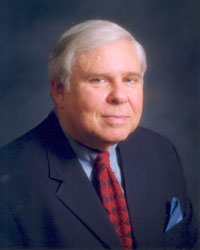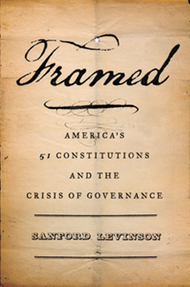 The American Constitution has been the subject, just as Thomas Jefferson predicted, of a great deal of “sanctimonious reverence,” especially from American politicians who make comments demonstrating they know little about it. But the Constitution has few more-dedicated critics than political scientist and law professor Sanford Levinson, who has offered the most thorough explanation yet of why it has effectively ceased to be an attractive model to other nations around the world. I put six questions to Levinson about his new book, Framed: America’s 51 Constitutions and the Crisis of Governance:
The American Constitution has been the subject, just as Thomas Jefferson predicted, of a great deal of “sanctimonious reverence,” especially from American politicians who make comments demonstrating they know little about it. But the Constitution has few more-dedicated critics than political scientist and law professor Sanford Levinson, who has offered the most thorough explanation yet of why it has effectively ceased to be an attractive model to other nations around the world. I put six questions to Levinson about his new book, Framed: America’s 51 Constitutions and the Crisis of Governance:
1. We read the refrain “The system in Washington is broken” almost daily in the editorial pages—from columnists like Thomas Friedman and David Brooks to more serious analysts like Norman Ornstein and Thomas Mann, whose latest book takes the controversial next step of assigning blame for the problem to the G.O.P. Do you see any shortcomings in this analysis?
Friedman especially frustrates me. He is at one and the same time perceptive and remarkably obtuse. I applaud his emphasis on the pathological nature of our current political system. But he is absolutely unable (or unwilling) to connect the dots between the pathology he diagnoses and the Constitution of 1787, which, with only slight structural amendments, continues to shape our politics. Put to one side the shame that is the Senate, with its equal allocation of power to Wyoming and California. More important is that our political system creates a strong disincentive for members of a party to work with a first-term president from the opposite party. The explanation is simple: the electorate will almost certainly reward the president for “bipartisan” accomplishments and thus reelect him. This is, basically, the story of 1996, when Bill Clinton, by signing a quite dreadful welfare-reform bill, went on to crush Bob Dole, and of 2004, when Ted Kennedy was the central instrument of Bush’s election, I believe, because of their joint collaboration on No Child Left Behind and the prescription-drug bill. Mitch McConnell is not going to make that kind of mistake.
Mann and Ornstein are far, far more institutionally acute than Friedman, but even they resist accepting the extent to which their diagnosis ultimately counsels some basic constitutional changes. One can understand their reluctance. A central trope of the critical literature, such as Robert Dahl’s How Democratic is the American Constitution?—answer: not very—is that nothing can be done to cure the ills, given the most truly dreadful part of the Constitution: Article V, the amendment provision. Practically speaking, it is next to impossible to amend the Constitution with regard to anything truly important. For better or worse, though, we really do have to generate a national conversation about constitutional change.
2. In their new book, Amy Gutmann and Dennis Thompson say that the spirit of compromise essential to American democracy has failed because of our modern campaign culture. They cite the Tea Party and its powerful influence over the G.O.P. in the 2010 elections, when Republicans who had been the vehicles of barter and compromise were consistently targeted and eliminated. You seem to agree with this assessment. Does it point to a fundamental flaw in the constitutional structure of our government?
I haven’t yet read the Gutmann and Thompson book,
My friend Mark Graber argues that the implicit bargain in 1787 included the principle of “bisectionality,” by which no great changes concerning the treatment of slavery would occur without the assent of both North and South. That is, there is nothing “un-American” about John C. Calhoun’s theory of the “concurrent majority.” The great rupture was Lincoln’s election (with 39.8 percent of the popular vote) in 1860 and his adamant refusal to compromise on the issue of extending slavery into the territories gained through the Louisiana Purchase and the Mexican War. Was he right to do so? He could clearly have saved the Union by assenting to the spread of slavery. If one applauds Lincoln for his failure to compromise, then does this suggest that those who opposed ratification in 1787 because of the succor given slaveholders were right? Or was a “compromise with the devil” necessary in 1787, but not in 1860?
[Update: Professor Levinson elaborates on his response to this question in a post at Balkinization.]
3. The filibuster plays a central role in the argument that Washington is gridlocked, but it is not a constitutional concept. Arguably it cuts against the Constitution, given the prescription of a limited number of matters for which an extraordinary majority is required. Wouldn’t it be a simple fix to modify the filibuster rule by reducing the number of votes required to bring a measure to the floor when the Senate next convenes?
Fortunately, this question can be answered briefly: yes. To elaborate a bit, I fully expect a Republican majority in the Senate, should Mitt Romney be elected, to do exactly what you suggest. The Republican Party is determined to make its mark and will brook no opposition from 49, let alone 41, Democrats. What if the next Senate is evenly split? Then we will have the opportunity see one of the more bizarre features of the Constitution in action: If Obama and Biden lose the election, Biden will remain president of the Senate when it convenes, as required by the Twentieth Amendment, for the first time on January 3, 2013 (among other things, in order to count the electoral votes and declare the winners). This means that he would get to break a presumptive tie between filibuster-abolishing Republicans and now-filibuster-friendly Democrats. If Biden voted to maintain the filibuster, that would presumably settle the issue for the entire session and therefore guarantee that Democrats could block radical Republican measures, at least. The question, of course, is what if—unexpectedly, but not impossibly—not only are Obama and Biden reelected, but the Democrats retain the Senate and even gain back the House? Will they have the political will to do what I predict the Republicans would do were they a majority?
4. As you argue, the American constitutional tradition comprises not just the federal constitution, but the constitutions of the fifty states. The latter generally reject the notion of a unitary executive, choosing instead to give voters the option of dividing the executive branch of government between parties, most frequently by allowing the state’s chief law-enforcement officer, the attorney general, to be selected apart from the governor. Does this approach recommend itself for consideration for the federal constitution?
I think the key word in your question is “consideration.” I’m very much in favor of a new constitutional convention. On some matters, I have very strong preexisting opinions—like abolishing life tenure on the Supreme Court—even as I recognize that I might have to engage in compromises if push came to shove. On others, such as the desirability of breaking up the “unitary executive” by separating presidents and attorneys general far more than is now the case, I’m an agnostic. If one takes seriously Louis Brandeis’s encomium to federalism as allowing states to serve as “little laboratories of experimentation,” then we ought to look more carefully than most scholars have done at the forty-eight states that split up governors and attorneys general. There, the central question should be whether the same impulses that lead us to support judicial independence should apply to the attorney general.
But there’s another important point contained in your question, which is the fact that what Harvard’s Jacob Gersen calls the “unbundled executive” means that gubernatorial elections are not the winner-take-all phenomena that national presidential elections are. Both parties can, and often do, win particular offices, and the world doesn’t come to an end.
5. If we were to look back two generations, we would find a Supreme Court filled with persons of national prominence who had held high elective or appointive office and who represented a wide geographic area of the country. Today’s Supreme Court, as you note, is narrow, drawn from judges who were known previously only to lawyers and legal scholars, nearly all of whom went to Harvard or Yale and lived and worked in America’s northeastern corridor, and a majority of whom are conservative Catholics. What has produced this skewed demographic? Should we be troubled by it?
I think the quickest explanation is that Republican presidents, especially, have touted the value of judicial experience, an ineffable quality that only Justice Kagan on the current bench lacked at the time of her appointment. I don’t think such experience should be disqualifying, but a nine-member Supreme Court should indeed have a membership with truly diverse backgrounds, including experience in the world of electoral politics—no member of the current court has even run for public office, let alone been elected—or administering an important agency like, for example, Health and Human Services or the Environmental Protection Agency. Only Clarence Thomas qualifies, depending how important you think the Equal Employment Opportunity Commission is. It is a truly awful feature of the Supreme Court that no justice since Thurgood Marshall has seen the inside of a trial courtroom while acting as a criminal-defense lawyer.
6. You write, “If we assumed that the president has the power to initiate war, commandeer funds and resources for war, and conduct it at any time for any reason in any manner he pleases, he would be a constitutional dictator with respect to war.” Does the recent experience of the Libya campaign suggest that the president’s war-making powers are creeping toward constitutional dictatorship?

Again, the answer can be given all too briefly: yes. One of the things I am trying to do, both in my writing and teaching, is to revive a serious discussion of the notion of “constitutional dictatorship”—the title of a brilliant and troubling book from 1948 by Clinton Rossiter. How could we assure effective decision-making authority by presidents, given the new actualities of nuclear weapons and the like, without sliding into authoritarian dictatorship or worse? This discussion goes back to ancient Rome, which Machiavelli and Rossiter both cited as an important template. Perhaps it is telling that that discussion seems to have died around the time of the Cuban missile crisis, which is surely the most dramatic and ominous example of presidential unilateralism in our lifetimes.
Almost all constitutions drafted after World War II include “emergency powers” clauses that assay responses to the problem. Some of these clauses, such as South Africa’s, are better than others, but they are all serious efforts. The United States, on the other hand, gets along with a constitution that has very little to say on the subject. There is the habeas-corpus clause, which is of some importance, though perhaps less as a matter of fact than we might hope. But we should be well aware that there are emergencies besides those dealing with national security (or “humanitarian intervention,” as in Libya or, perhaps, forthcoming in Syria) that raise important questions about decision-making authority and the potential for unchecked power. There are also, for example, economic emergencies, public-health emergencies, and, of course, natural disasters like Katrina.
One of the questions we need to ask ourselves is whether the people we elect as presidents are particularly suited to making the kinds of decisions that such events call for. Are presidents anything other than “gifted amateurs” whose principal skill is figuring out how to climb the greasy pole of American politics and gain entrance to the Oval Office?


